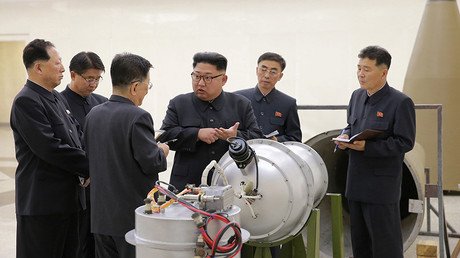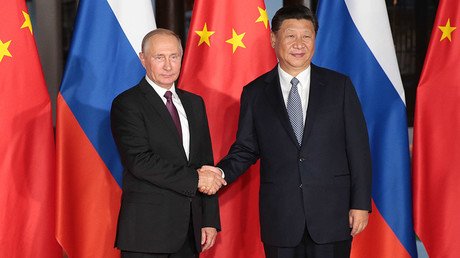‘North Korea doesn’t want war; it wants cast iron assurance of regime stability’
Sanctions and rhetoric over North Korea’s missile tests have failed to solve the problem; only a Korean Peninsula stability pact could become a solution, says independent Asia specialist Andrew K.P. Leung, adding that Pyongyang doesn’t want war.
North Korea claims it has successfully tested a hydrogen bomb which can be mounted on an Intercontinental Ballistic Missile (ICBM).
Trump: N. Korea hostile and dangerous to US, talk of appeasement won’t work
Pyongyang’s sixth and most powerful nuclear test on Sunday has sparked international condemnation. US President Donald Trump referred to North Korea as a “rogue nation” adding that its actions “continue to be very hostile and dangerous to the United States.”
Andrew K.P. Leung, in his comments to RT on the latest escalation, said that he expects “even more sound and fury” from the US to follow, but that’s not going to solve the problem.
Andrew K.P. Leung: I think the time for coercion is over. North Korea has successfully crossed the watershed and has demonstrated its ability to deliver a very powerful nuclear weapon. If it’s not a full-scale hydrogen bomb, at least it’s as powerful as the nuclear bomb dropped in Hiroshima and Nagasaki. North Korea has already demonstrated its ability to deliver its missiles flying over Japan to near where Guam is. I think... the time for a lot of rhetoric and sanctions is really over. What the North Koreans want is, of course, not a war, because a war would mean the demise of their regime. They want a cast-iron assurance of the regime’s stability. It’s time to move on from talks to a Korean Peninsula stability pact involving all the countries in the region. The pact should make sure that there is de-escalation by all sides. It would aim at North Korea at least freezing further [missile] tests and the Americans toning down, not only the rhetoric, but also military exercises… The stability past should also ensure that all the countries [involved] move on from a paradigm of coercion to a paradigm of incentives… combined with even opportunities for economic cooperation. That’s the only way to stabilize the situation.
RT: Many people would say that it sounds very logical, but we seem to be very far away from anything like that happening.
AL: Absolutely. Because the US and the Trump administration believe that the solution lies through military means. That’s the only tool in the work kit. But it hasn’t proved to be successful. If you want to attack the North Koreans – its missiles are hidden in caves, and they are mobile and you can’t be sure that you’re going to take out everything. At the end of the day, it would destabilize the entire peninsula. The talk of decapitation doesn’t work either. You can’t be sending a small number of troops, including even the South Koreans, because after you destabilize the regime – what are you going to do? The whole thing would implode. Then you’d have to send more troops. And Russia and China would of course not stand aside and watch that happening. I think any other options would destabilize the situation even further. All sides have got to come and grasp the nettle.
The statements, views and opinions expressed in this column are solely those of the author and do not necessarily represent those of RT.














